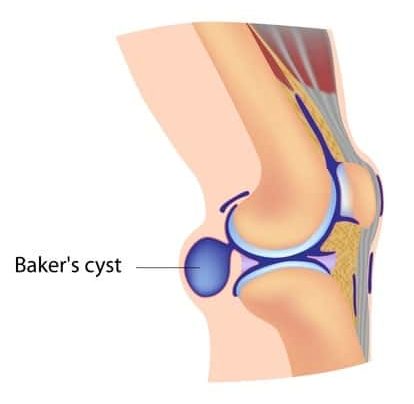
A Bakers cyst is a fluid filled sac that can form in the back of your knee. When the cyst is large, it will cause a bulge in the back of your knee. If the cyst is large enough you might have a feeling of fullness or tightness in the back of your knee. A Bakers cyst is not dangerous. Many people who have a routine ultrasound of their leg for other reasons will be found to have a cyst.
What Is A Bakers Cyst?
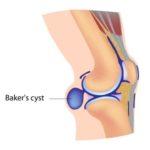
Why Do I Have a Bakers Cyst?
A Bakers cyst will form if there is fluid in your knee. If enough fluid collect in your knee joint it will decompress or move into the back of the knee and cause a Bakers cyst to form. Osteoarthritis is the number cause of fluid in your knee. Osteoarthritis is an inflammatory condition. In response to the inflammation the body creates fluid. Some people will have have a small amount of fluid, while others will create a ton of fluid which will ultimately cause a large cyst to form.
Can A Bakers Cyst Rupture?
Yes, many people with a Baker’s cyst will feel a pop in the back of their knee. Over the next few hours they will notice pain in their calf as well. The pain occurs because the cyst ruptured and the fluid leaked down into the area around the calf muscles. A ruptured cyst is not dangerous and the pain in the calf will usually subside and improve over a few weeks.
How Do You Treat A Bakers Cyst?
A cyst only requires treatment when it becomes large enough to cause pain or loss of motion. When a cyst is very large you may have significant pain in the back of the knee. You might also note that you can not straighten your knee. If that occurs then aspirating or removing the fluid from the bakers cyst should improve your pain immediately. Unfortunately, many people will notice that the swelling returns. That’s because the knee is still producing fluid because of arthritis. Therefore we might recommend anti-inflammatories or steroid injections to try and diminish the degree of inflammation in your knee. A Bakers cyst almost never requires surgery to remove it.
Do you have questions regarding an Orthopedic injury or longevity?
Do you want to talk to an expert who can listen to you for 45-60 minutes and explain the options in detail?
Dr. Howard Luks offers remote guidance sessions to review your X-ray or MRI images and explain your options.
Dr. Luks has also received hundreds of requests for educational sessions on the topics discussed in his book, Longevity Simplified.

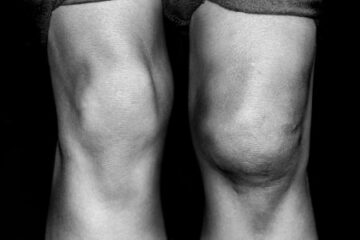
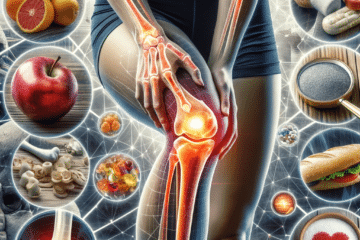
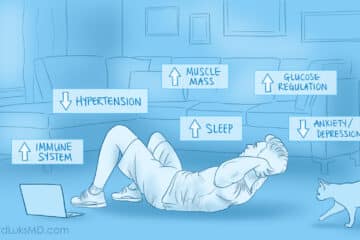








Susanne
Dr. Luks,
I am an RN with 2 meniscus tears in my R knee that are causing significant pain. I have a tear in my L knee that responded well to a steroid injection but I feel this is a bandaid and the pain in my R knee is so much worse. I saw my Ortho doc recently. After reading your articles I realize that my physician’s replies to my questions were very inadequate. It seems that the decision of surgery was left entirely to me. I am disturbed by this and doubting that I have the best doctor for my issue. My goal is to find pain relief so that I can return to work and get back to life. After reading the thorough info that you provide, I realize that surgery may not be the answer. However the pain is difficult to deal with. I guess I could seek a second opinion.It’s a delicate issue as I work with these physicians. I am not an ortho nurse so my understanding of these types of problems was limited. Thus I decided to do some research on the net. I am a young 68 yrbold and in good health. Most likely these tears are degenerative. I’m sure that 35+ yrs of FT nursing is a contributing factor. I planned to work until age 70. Am I being unrealistic? I realize that you don’t have my MRI results etc. but based on the info I have supplied, I would value your opinion. Thank you,
At your age… these tears are usually associated with some osteoarthritis (OA). The OA is usually what hurts the most — which is why injections are beneficial as they diminish the inflammation from the OA. The “best” treatment for you would depend on your studies and your exam. Weight bearing X-rays are likely more important than the MRI. Arthroscopy in a late-middle aged female for a degenerative meniscus tear in the setting of moderate OA can lead to problems such as stress fractures, stress reactions, bone marrow edema, and rapidly progressive OA. Best to avoid if possible.
Good luck
Jacki Gillen
Thank you so much for comments on Baker’s Cyst……I’m not going to obsess about mine any more.
And thank you also for your wonderfully informative posts on everything related to my athletic but aging body.
I’m happy to hear you find them useful ~! :-)
/hjl